Drive-by Advice: Find Ways To Recharge Your Extrovert Batteries Without Draining Your Avoidant Ones!
drive-by advice: find ways to recharge your extrovert batteries without draining your avoidant ones!
here’s a shortcut –
is there stuff that doesn’t involve direct socializing at all, but still lets you extrovert and absorb experiences?
for example
going to a music concert or festival
a sports game
a flea market or farmer’s market
traveling
visiting a public park
eating at a restaurant
driving in traffic
walking through the city
hiking
spending time with animals/pets
expressing yourself creatively
people-watching
reading forums or nonfiction books
and under the readmore, I’ll throw in some questions that might be helpful to think about~ good luck!
try and figure out what types of socializing you like, and what you don’t like. think about the people involved, and the level of personal interactivity:
how many people you’re with
how well you know them
the location
any distracting activities you’re doing
whether you’re doing the activities together (like playing video games against each other) or individually (like studying), interacting actively or passively
is there a pre-decided/built in time limit?
and (very important)
the level of personal connection / vulnerability / visibility while you’re with them
as an extrovert, what makes you feel better? what kind of interactions seem really satisfying to you? (there are different shades of extroversion; there’s no right or wrong answers, the important thing is to figure out what works for you and what you need)
do you need to have a personal discussion with someone in order to feel content? or just talk about random (impersonal) stuff? or casually bump into each other throughout the day? or hang out quietly in the same space?
(also consider, who qualifies? if there’s more than one person, what common traits do they have? how do they make you feel? can you generalize what it is about them that makes them good to spend time with? + who else do you know that fits those traits?)
and with your AvPD:
what kind of stuff makes you super avoidant? (this is hard to think about, but try, even tiny clues are helpful!)
what type of interaction do you really dread? try and identify what aspects of it are contributing: is it being around too many people at one time? too few? people you know very well, or not well enough? the environment – in public vs. semi-public vs. private? settings that discourage talking (movie theater, library) vs. encouraging it (eating a meal together)? what about when you’re at home vs other places?
okay, one more point:
if you don’t currently have anyone to interact with in positive ways, or if meeting people is one of your biggest problems right now, still think about this stuff. try and imagine your ideal situation to socialize in, with all these variables. really picture what you’d enjoy!
and then if possible, go do those things, even if you do them alone.
why? because the kind of person you want to hang out with is gonna be drawn to the same places & activities as you. you don’t even have to “be friends” with them if that’s not what you’re looking for; you can just meet up to {play pool, video games, chess, basketball} or be workout buddies or watch new films or whatever you’ve figured out is what you want. especially if you want someone who’s not invested in forming a Close Emotional Attachment – then you’re basically looking for a person who cares more about {whatever activity}, and they’re probably already there.
plus, even if you don’t (or don’t want to) meet anyone, you still get to do fun stuff that you enjoy! and that generally makes life a little better :>
if you DO want to really make friends with someone -- in the typical sense, with mutual support and trust and sharing feelings -- you can still do it that way! though there are other ways to meet people as well.
but you see it all depends on how you want to connect with people. that’s why, in any scenario, it’s important to figure out what you want and need :)
being extroverted and avoidant fucking sucks
I don’t have personal experience with this, but I’m sure it is and I’m sorry that you’re struggling. And I’m also sure that plenty of others are dealing with the same thing, so know that you’re not alone. I wish you the best!
- Shinji
More Posts from Zella-rose and Others
being in love with the process and not the results is one of the healthiest things in the world
Stay close to people who make you feel like it’s okay to be yourself.
september will be kind. september will be magical. september will bring the missing energy. september will be working towards our goals and self. september will be a month full of growth.
i mean, but also, knowing your limits and knowing when you need to step back so that you don’t act resentful or stressed out by your own kids, is part of being a good parent.
everyone has limits. getting to take a break can make you a better parent, because you’re a little refreshed when you get back, and you’re actively glad to see your kids, and it makes you happy to be with them! they can see that stuff clearly, too.
it’s OK to recognize that you as a parent need more support and more time to not-always-be-parenting. to retain your sanity and self-perception as your whole self and not just the parenting role. burnout is a real thing, and shutting down people who are grappling with this particular stress isn’t going to help them acknowledge or move through those feelings — or figure out ways to help themselves de-stress, recharge, and nourish themselves in spite of their life pressures.
no human can be 100% on, 100% of the time, and that doesn’t change when you have a kid. this is a huge part of why extended families and local communities are so important in child-rearing (‘it takes a village’) — having support makes you, yourself, a better and more patient parent, because you aren’t constantly running on fumes.
speaking from personal experience, my parents raised me without any help. it was really hard on them — and on me, because that just isn’t how children are meant to grow up. but it’s not how parents are meant to parent, either.
i understand that better now that i have kids myself and, hey, i’m still autistic! my limits are clearer than most people’s, and maybe as a result i need more help (=auxiliary carers so that i can take care of myself). it sure has made me aware of this balance.
of course, yes, it’s absolutely not okay for your kids to think or know that you resent them/parenthood, or that you don’t want to be around them. and they REALLY DO know much more than others guess. (again, i was one of those kids. a lot of us were, i imagine.)
but the best way to prevent that whole mess from happening is to handle your feelings yourself, so that you can engage in parent-child interactions better. (with calmness, affection, wisdom, humility, blah blah.) but that requires time and energy for self-care, which is obviously in short supply. aaannnd it also helps not to be judged by strangers on the internet.
sometimes venting to an adult is how you meet your emotional needs enough to leave that stuff aside, and go be genuinely present with your kid, with gratitude instead of resentment.
self care skills are parenting skills. ❤️

AvPD theory: social dysregulation
Part of Avoidant Personality Disorder is like … a failure to regulate social experiences. Like we don’t properly integrate or process what we feel.
Interacting with someone means feeling visible, connected, and like you are a self-among-selves: you’re existing as a person, in the presence of others.
Most folks, of course, can handle that effortlessly. They even seek it out.
People need social ‘background noise’ and social stimulation.
They reach out easily and often, just because it feels good to them.
Socializing gives them a sense of comfortable connectedness. And relief from isolation – they don’t “exist in a vacuum.”
It helps smooth out their inner experiences, thoughts and feelings.
But with AvPD, I don’t think we process social input normally.
The sensations of interacting don’t feel like how most people feel them. Being visible, connected, a person – it just seems dangerous and harsh.
And we can’t put these feelings into context.
We can’t step back from them, or control how much they affect us.
We don’t have the ability to regulate what we’re experiencing.
That means nearly all social stimuli are negative to us, whether friend or foe. Being-in-contact-with-people is all it takes to distress us.
It’s overwhelming and de-stabilizing.
It provokes more big feelings, and reactions we don’t feel safe facing.
Our inner experience is turned into chaos.
We’re left feeling helpless, afraid, inexplicably ashamed.
We want positive connection. But we usually end up with painful chaos instead.
And it’s a thousand times worse if you’re having an actually negative encounter, like facing someone who’s angry or criticizing you.
Social perfectionism is about trying to escape this:
“I might be able to enjoy this thing… but only if nothing goes wrong ever.”
Perfectionism is a great misdirect. Because “every possible problem” is not the issue that needs solving.
What we need to do, is learn how to experience social input in a positive way. And un-learn all the bad habits that have grown instead.
(more here!)

If you’re struggling, here’s some words from Angry Prayers for Furious Survivors
Honestly, from what I’ve read, this general pattern seems almost-typical for AvPD.
We’re good at masks, at acting through situations. We’ve usually learned how to “pass” and seem “good enough” on the surface. That’s so we can escape being noticed for who we actually are -- rather than “how” we can act.
It’s a kind of invisibility. And masks can suffice, until somebody tries looking behind them. (Not because we’re defective and the cat is finally out of the bag!, but because ... when we feel exposed, we run away. Yep.)
This isn’t necessarily the same as social anxiety; different things can make us feel exposed. Like I’m fine chatting with strangers, but people I’m close to? Who expect me to have things to say? Hoo boy.
Also: Yes, I definitely do the “avoid, avoid, oh no it’s too late to choose” thing. Usually by being noncommittal when people ask me to do something. (I should really write a post about that.) I’ve started not doing it, though, which is a real adventure.
Followers & other AvPD peeps, how about it? Do you relate to any of this stuff?
AvPD Pondering Two…
I avoid my problems a lot and lie quite a bit to make myself seem more capable. I know the problems won’t go away by ignoring them, but I always feel like if I can get them to a point of no return then I can deal with the aftermath better than trying to fix the problem. I’d rather face the consequences than fail at trying to right things in the first place. And I do this consciously. Sometimes I wait and see if the issue will resolve itself, and by the time I realize it won’t I’m in Too Deep and I just kind of… let it happen. I don’t know if it’s because then I can tell myself there wasn’t anything I could do about it, or obviously if there had been an easy solution I would have done it, etc?
But then, whenever I see people admit to their short comings I’m like, how do they do that?? And people still like them?! Even after they mess up or have a different opinion or get angry. They are still thought of with as much respect as they were before they did something Wrong. I don’t know why I can’t see how that could be said for me too, but I just can’t. Which means I’m hyper critical of myself whenever I do anything even slightly off. I don’t even like telling people mundane things for fear the ‘facts’ will change in the future and I will have been the deliverer of False News. Even with factors outside of my control. Like if I say something it’s the absolute truth, and if I have to go back on what I said it’s Not Good, but with others it’s fine. I understand mistakes happen, and plans change, it’s just that when I’m the one relaying the message the same logic doesn’t hold. I feel like it’s my fault when I’m misinformed.
And this is the last, and most intriguing to me, point I have for this post before it becomes too long- Is anyone really good at first impressions? I have a lot to write about in regards to how I think I portray myself and how I get through social interactions, but a big chunk of that, that I didn’t understand until now, is that I’m great at first impressions. I’m good at putting on a Face and being relatable and then I’m SUPER good at keeping it superficial. I make better first impressions than my introverted, or shy friends, but they’re better at staying on top of the relationship as it progresses. Because they’re becoming more themselves as they get comfortable and I’m becoming distant as I get uncomfortable.
(I’m actually really interested to see if anyone else relates to the first impressions thing. Because I used to wonder why I could do so well and then fade away every. time. And I finally realized it’s because I don’t want relationships to progress, and I wonder if others do the same? A way to keep people at bay? Because I know a lot of people with AvPD seem to have social anxiety tendencies as well, and are uncomfortable around most people, and I’m not really sure I relate to that.)
all i’m interested in lately is love, laughter, my personal health, growth, and becoming an all around radiant soul.
I think… one of the interesting things about online messaging and texting is that sometimes, writing out your feelings to someone is actually so much easier than speaking them. Like, I cannot easily express myself through verbal words. I stutter, I panic, I say “nevermind” because I can’t bring myself to admit the words out loud. But with online messaging, I can blabber on the keyboard like a stream of consciousness, and I can express myself to my friends in a way that’s sometimes very hard for me to do irl
Which is why I’m so defensive about this whole belief that face to face communication is more real than online interactions. In a way, yeah, it is, because it’s more literally “real,” and im not at all gonna deny the value in irl relationships. But online communication has genuinely allowed me, a socially anxious person with a fear of opening up, to develop meaningful relationships with people, and you don’t understand how grateful I am for that


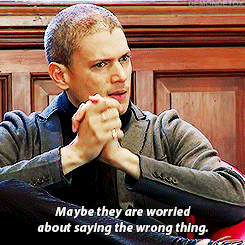
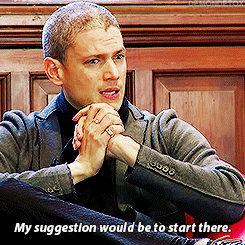
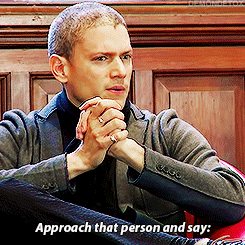

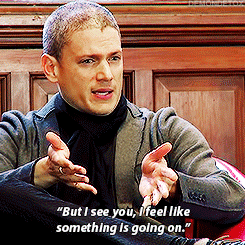
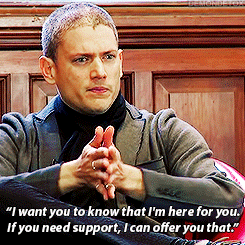
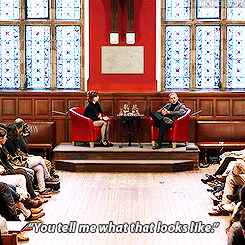
“In that way, you’ve acknowledged that you’re unsure, that you don’t know what to do or say. You’ve acknowledged that you see them. They feel seen. They feel heard and acknowledged, which is huge for someone who’s in crisis.” Wentworth Miller | Q&A at Oxford Union | 2016 | x
-
 starlanc3 liked this · 7 years ago
starlanc3 liked this · 7 years ago -
 apparently-adhd liked this · 7 years ago
apparently-adhd liked this · 7 years ago -
 juju4hugz liked this · 8 years ago
juju4hugz liked this · 8 years ago -
 thisavpd liked this · 8 years ago
thisavpd liked this · 8 years ago -
 apocalypticinsomnia liked this · 8 years ago
apocalypticinsomnia liked this · 8 years ago -
 souluos-blog liked this · 8 years ago
souluos-blog liked this · 8 years ago -
 kibawolfe liked this · 8 years ago
kibawolfe liked this · 8 years ago -
 peopleiknowfoundme liked this · 8 years ago
peopleiknowfoundme liked this · 8 years ago -
 emmaloueez reblogged this · 8 years ago
emmaloueez reblogged this · 8 years ago -
 pajarx liked this · 8 years ago
pajarx liked this · 8 years ago -
 zella-rose reblogged this · 8 years ago
zella-rose reblogged this · 8 years ago -
 mantismen liked this · 8 years ago
mantismen liked this · 8 years ago -
 avpdcommunity reblogged this · 8 years ago
avpdcommunity reblogged this · 8 years ago